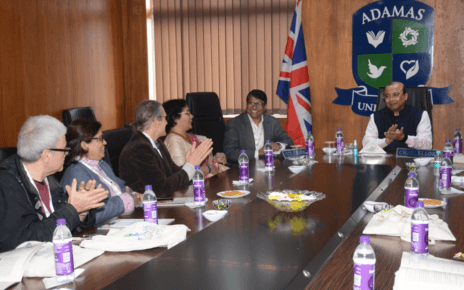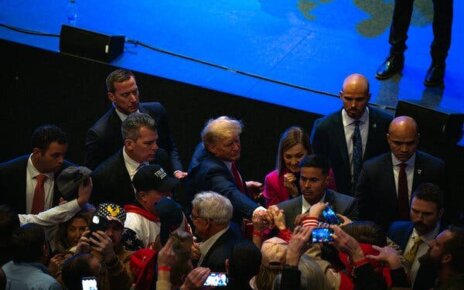Three former New Jersey Governors and two state Senators from both parties joined forces on Wednesday, Apr. 3, to speak about bridging political divides during a “Reclaiming Civility in Public Discourse” event in the Great Hall auditorium.
Roughly 150 people attended the “Reclaiming Civility in Public Discourse” event sponsored by President Patrick Leahy, the College Democrats, and the College Republicans. The event featured former New Jersey Democratic Governors Richard Codey and Jim McGreevey, former Republican Governor Tom Kean, former Republican State Senator Joe Kyrillos, Democratic State Senator Vin Gopal, and was moderated by NJ Spotlight News anchor Briana Vannozzi.
Kean was elected Governor of New Jersey in 1981 and re-elected in 1985. Following the attacks of September 11, 2001, then-President George W. Bush appointed Kean as the Chairman of the National Commission on Terrorist Attacks Upon the United States, known today as the 9/11 Commission.
McGreevey was elected governor in 2002 and resigned in 2004. For years following his governorship, and still today, McGreevey has served as Executive Director of the New Jersey Reentry Corporation, which Gopal said “has helped tens of thousands of former inmates have a second chance.”
Codey became acting governor following McGreevey’s resignation from 2006 until 2008, when he decided not to run for a full term as governor. Instead, he ran again for state senate and is the longest serving state legislator in NJ history, serving 50 years from January 1974 to January 2024.
The event began with President Leahy, who delivered opening remarks. Leahy said, “Today we have the greatest collection of political talent ever gathered on our campus at one time.” He then continued, “The idea of this is simple: how do we restore civility and common ground to our public discourse? How do we, in our country, dislike, even hate, the thought or idea or belief of another, but not necessarily hate or dislike that other person?”
After reading an excerpt from President Abraham Lincoln’s inaugural address, Leahy introduced MU College Republicans Chairman Jacky Bruno and MU College Democrats President Owen Bros to introduce the two Senators co-moderating the discussion.
Bruno began his speech, “Hopefully this will leave you all with a renewed sense of respect for those across the aisle, no matter where you stand.” After giving a brief background, Bruno introduced former Republican State Senator Joe Kyrillos.
Bros then began his speech, “This is an event we have been looking forward to all semester… hopefully when you leave here, you will understand how bipartisanship works and your fellow Americans.” Bros then introduced incumbent Democratic State Senator Vin Gopal.
Senator Kyrillos began the discussion by acknowledging Bros and Bruno. “These presidents are great young men who get along,” he said. “I asked if they were friends, and they said they were, so we’re off to a great start.”
Seated on the stage, from left to right was Senator Kyrillos, Governor Codey, Governor Kean, Governor McGreevey, and Senator Gopal, with Vannozzi just off the stage at a lectern. Kyrillos then handed the stage to Senator Gopal who said, “It’s great to see a packed room here. We know now more than ever at this point in our country, we need civil discourse. We need to be able to respect the person across the aisle, even if we have strong disagreements.” Gopal then introduced Vannozzi.
Vannozzi said in her opening speech, “If not for the governors sitting before you, we would not have 800 acres of preserved highlands, we would not have alternate routes for folks who decide that they want to become a teacher but didn’t study it first in college, we would not have a ban on indoor smoking, we would not have a number of the education reforms that have enabled many of us to be where we are, MetLife stadium may not be in New Jersey, and all of that was thanks to these governors working across the aisle.”
The first governor to speak was Kean, who opened with a story about the Democratic governor that came before him, Brendan Byrne. Kean mentioned that Democrats were in control of the state legislature for most of his time as governor, and that Byrne “was enormously helpful to me as governor because he was my secret source… if we hadn’t been able to get along, if we hadn’t been able to work together, I wouldn’t have accomplished anything at all.”
Vannozzi then turned the floor over to McGreevey, who began by acknowledging Kean: “For those of us who grew up in New Jersey, it’s like sitting next to Moses… there are few people in my life who are as decent and good as Governor Kean.” McGreevey went on to say he didn’t know if New Jersey would ever see a political figure as effective and decent as Kean.
Kyrillos spoke next and talked about the partisanship and lack of cooperation in the United States. He said, “In the times we’re living through now, where you have red states and blue states, there’s no opportunity to find that middle ground.”
Kean spoke about a rule he implemented as Speaker of the NJ Assembly that required every bill have one Democrat and one Republican sponsor. Kean said of today’s divisiveness, “I don’t know how it’s gotten this bad, but I never would have expected it to become this bad.”
Kyrillos also responded to the question about increased division. “We have people that are on extreme wings of both the right and left,” he said, “and you couldn’t get that kind of constructive, productive meeting these days… that’s the problem.”
McGreevey backed up Kyrillos point and agreed, “Driving to the center is driving to common sense.”
Gopal then discussed the Republican and Democratic Party. He said, “I’m not a fan favorite of a lot of Democrats in the state… we’re looking at a Republican Party right now that is not the same when Governor Kean was there.”
Gopal continued, “It’s a party that, at this point, the standard bearer questions the peaceful transition of power, so there are going to be areas of absolute civil discourse… it’s not even the party of John McCain, George W. Bush, and Mitt Romney.” While Gopal was calling out “the standard bearer,” referring to former President Trump and his efforts to overturn the 2020 election, the two Republicans on the panel, Kyrillos and Kean, were nodding in approval.
Kyrillos then began talking about Gopal, who refer to one another as close friends. Kyrillos said, “I think Vin Gopal is a great state senator.”
Codey then joked, “Can we have that clip for the next election?”
Kyrillos jumped back in and said, “I always feel that 65 percent to 70 percent of people out there do not like the politics of our country, and they want people to come together. They don’t like Donald Trump, and they don’t particularly care for President Biden.”
Kean spoke about his time on the 9/11 Commission, which he led, made up of five Democrats and five Republicans. He said the first time he went to Washington, he walked into the room where the members were seated. All the Democrats were on one side, all the Republicans were on the other, and Kean said, “Never in a commission meeting is a Republican going to sit next to a Republican, and a Democrat next to a Democrat. That’s just not going to happen.”
Kean spoke on the dynamic of the commission: “People didn’t know each other, and I started holding dinners at night with no agenda, just to get to know each other as people, not as Republicans or Democrats.” Kean said while the bonding and the actual work of the commission took a long time, approximately three years to be exact, he said, “We ended up with a very tough, unanimous report. Republicans and Democrats voted together and got a bipartisan bill through Congress in a very tough matter, over the position of the Pentagon.”
There were clear disappointments among the politicians with their own parties. Gopal called out the Camden County Democratic Party for running a “shadow candidate” as a third-party candidate, one with an almost identical name to the Republican candidate, to confuse voters and take votes away from the Republican nominee. On the Republican side, Kean said former President Trump “is not a real Republican.”
After Codey said he believed a second Trump term would be “much worse” than his first, Kyrillos agreed with a “definitely.”
Kean closed with a story about his friend who was studying in England during World War II and had the chance to ask Winston Churchill a question. The friend asked, “I’m a young American and think I want to go into politics, what should I do?” Kean said Churchill responded, “Young man, study history, study history, study history.”
Kean said of the story, “I don’t know if we’re studying history today,” echoing the same sentiment of a decline in civics education that McGreevey had mentioned.
Codey closed by talking about the 2024 presidential election. “This election is going to be very defining in terms of where this country goes… so hopefully whoever does win, will bring us together and not continue to try to take us apart.” Codey additionally said he considered the men on the panel friends, no matter the party they belong to.
Following the closing remarks, Vannozzi allowed for a few spectators to ask questions. Monmouth student Michelle Rymar asked the panel about the role of social media in political division today, which prompted a response by Senator Gopal: “If you look at the last election in New Jersey, it was about sex acts in schools and dead whales, it was not on any actual political issue… and it all stemmed from social media.” Gopal called on New Jersey’s federal delegation to bring more regulation and accountability to social media companies.
After a question on the lack of proper history and civics education in schools, an its possible contribution to such division, Richard Veit, Ph.D., Monmouth’s Interim Provost and Senior Vice President for Academic Affairs asked, “Do you have ideas, in terms of what we might do as an institution of higher education, to keep moving the conversation that you’ve begun here today forward?”
McGreevey answered, “Civics is so critically important,” and discussed increasing civic engagement on campus. Kean spoke to Monmouth’s professors about Monmouth student turnout and engagement at political or civic-related events, to which it became clear among professors is low. He said getting students engaged, especially in an election year, is going to be critical to bringing civility back to politics.
Following the event, Bros said, “Co-hosting this event with [Bruno] solidified both of our beliefs in bipartisanship… and had both of us thinking about a lot of different ways for us to bring more students to civics and bring our clubs closer together in future semesters.”
Bruno said, “My organization and the College Democrats are going to begin a plan to work together to get things done, including increasing civic engagement in our campus community… I think the ideas were solidified during our joint planning for this event.”
The panel discussion brought three former executives of the state of New Jersey, two Democrats and a Republican, together in what is a period of deep political divide in the United States. While reflecting on their own moments of bipartisanship and cooperation, they all shared the urgency to come together again. McGreevey said while the panel, and people simply talking to those they disagree with, is a tiny step, “Tiny steps make up a mile.”




